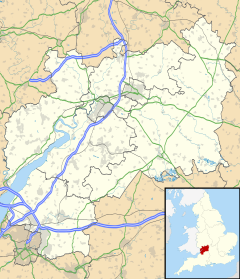Dudbridge
| Dudbridge | |
|---|---|
| Dudbridge shown within Gloucestershire | |
| OS grid reference | SO8305 |
| Shire county | |
| Region | |
| Country | England |
| Sovereign state | United Kingdom |
| Police | Gloucestershire |
| Fire | Gloucestershire |
| Ambulance | South Western |
| EU Parliament | South West England |
Dudbridge is a suburb on the southern edge of Stroud in Gloucestershire, England.
Dudbridge gains its name from the first bridge in the location, which spanned the River Frome. This made it an important crossing point for traffic heading south from the Cotswolds to the port of Bristol, which is reflected in that it is the meeting point of four parishes: Stroud in which lies, plus Rodborough to its east, and Stonehouse and Kings Stanley to its south.
The fast-flowing river made Dudbridge a natural location for early industry, with the earliest record of a mill dating from 1235. Later industries included dying, forging and metalwork.
The Redlers industrial estate is the site of the original Dudbridge Mills, located directly beside the River Frome. From the mid-18th century onwards it housed the three mills of Daniel Chance, who sold it to in the mid-18th century, owned three mills: one corn; one gig and a dyehouse with eight drying racks. In 1794, John Apperley's family for the next 140 years used the site for woll and cloth making. After the business collapsed in 1933, Redlers conveyors manufactured industrial handling equipment on the site until the mid-1990s, when it became an industrial estate.
The original Lightpill site is one actually located in Rodborough, but in light of inter-war and 1960s developments, exists now further in Dudbridge. A cloth mill from the 17th century, in 1910 it became home to a printing works. In 1910 Syrolit Ltd became one of the world's first plastic manufacturers, which in 1914 was reorganised into Erinoid ltd in order to gain a UK license to manufacture a German process to manufacture a new plastic substance used for buttons and ornaments. By 1933, the business had expanded south on the site and employed 500 people. Taken over by O. & M. Kleeman Ltd in 1957, it was than merged into Mobil Chemicals Ltd in 1961. In 1965 the complex was acquired by British Petroleum, operating initially as BP Plastics and later as BP Chemicals International Ltd. After takeover the site expanded west up to the Stroud railway line spur, producing polyvinyl chloride products, latterly bin bags. In 1973, when 700 people were employed, the factory manufactured polystyrene, articles in thermo-plastic materials for use in the electrical and building industries, and casein and polyester button blanks. To accommodate increased production, three large chemical containers were constructed on the west side of the railway line on the former dye works, supplied daily by Wincanton Transport trucks shipping raw chemical products from the docks at Southampton, Bristol and Sharpness. Closed in the late 1980s, the production site became the Bath Road Trading Estate, while the former dye works and chemical storage area became a new housing estate.
...
Wikipedia

